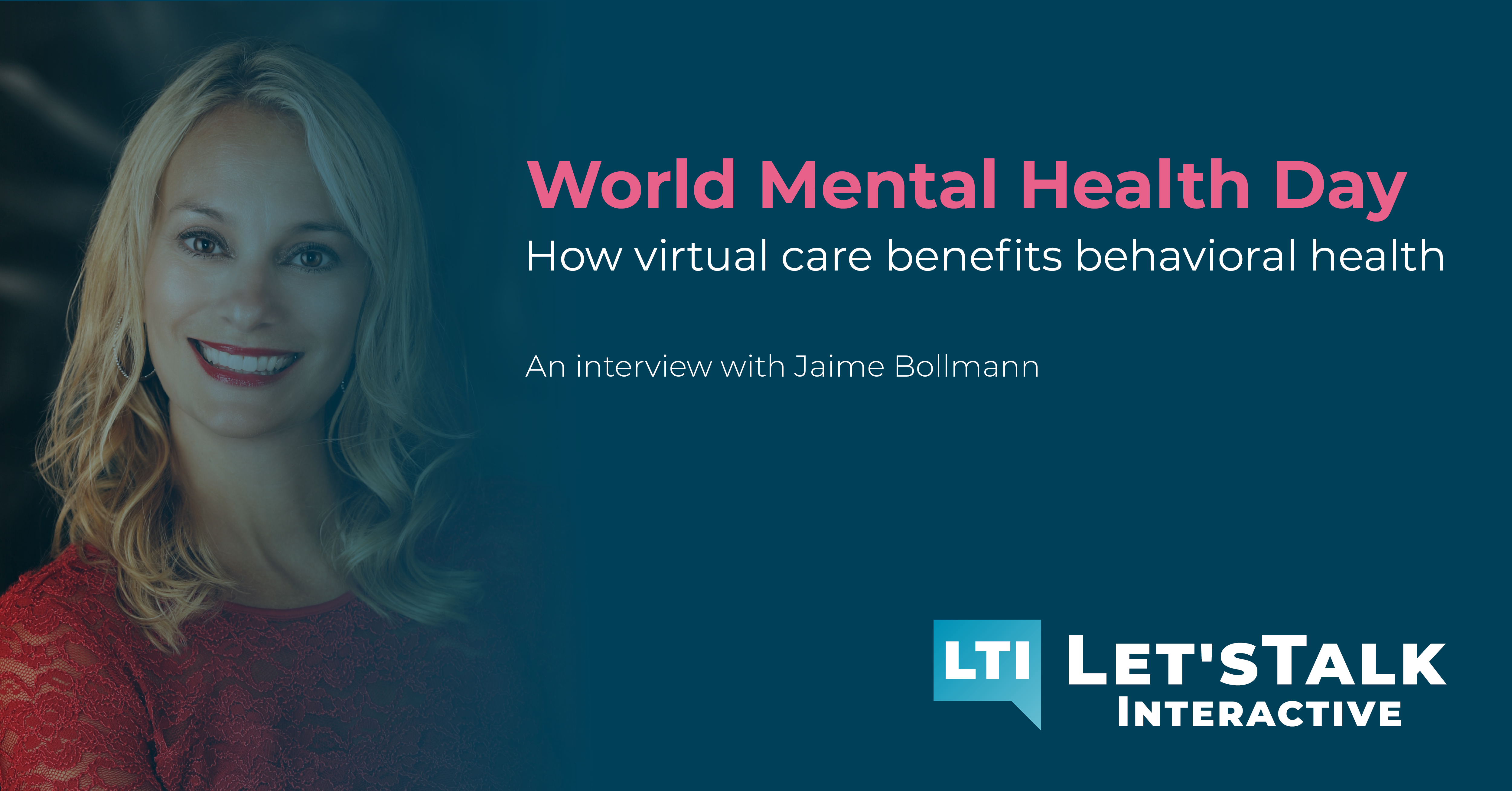World Mental Health Day - How Virtual Care Benefits Behavioral Health
Posted: October 07, 2022

In honor of World Mental Health Day, we sat down with Jaime Bollmann, Business Development Associate, at Let’s Talk Interactive. Jaime has a unique perspective to share, having transitioned to LTI from her role as a dually certified mental health therapist and substance use counselor in an outpatient clinic setting. Jaime shared her experience working as a therapist amid the mental health crisis we’re facing today, what inspired her to change her career path, and why virtual care is such an important element in providing mental health/substance use support to those who need it most.
Q. After working as a therapist for almost 2 decades, you recently joined our team as a Business Development Associate. What inspired you to make the career change?
I really loved helping and empowering people to make a difference in their lives. It was an extremely difficult decision to leave the field. However, at the end of the day, I found that I needed to improve my own self-care and work-life balance.
The provider shortages we are hearing about are very much a reality. All of the clinics that I know of in northern Wisconsin have long wait lists. I know this is similar all over the U.S. Having to explain my lack of availability to patients who were in need of care became a heavy, sad fact to deliver day after day. Most therapists carried a very large caseload because we all have a hard time saying “no” to any patient in need. Even then, the sheer demand of clients needing to be seen was staggering.
Ultimately, I felt like I could not be the provider that I wanted to be and the provider patients deserve to have. I felt powerless in a way that I could not give them the help they actually needed.
Q. What inspired you to join Let’s Talk Interactive?
I knew I wanted to continue to make a difference in people’s lives, especially those experiencing emotional challenges. I also knew firsthand the benefits of virtual care from using it on a daily basis with my clients. Many people still are not recognizing the amazing benefits of virtual care. Clients do not have to drive back and forth to appointments, allowing them to take less time away from work, school or home life. They can get support from the comfort of their home. It is especially great for rural areas.
As a former mental health professional, I believe that by educating people about the benefits of virtual care and our telehealth platform, especially those in the behavioral health space, I can make a difference on a bigger scale. And that is fulfilling to me.
Q. What are the largest benefits of virtual care to the behavioral health industry?
Addressing the immediate need for mental health services
Virtual care enables providers to meet with clients almost immediately (in most cases) - not three months plus down the road. Imagine something traumatic happening to you or your loved one. You want to get them help now. That is what virtual care supports. If your local provider network cannot offer support immediately, they can connect you with a provider virtually who can provide immediate support.
Easy access to care
Initially, many providers I worked with, including myself, thought patients would not like using virtual care to receive mental health support. However, the pandemic made virtual care a necessity, not an option. We realized the clients very much liked the experience. Unfortunately, the stigma with mental health and substance use treatment still exists. Walking into a mental health/substance use clinic, sitting in a waiting room with others from a small community, and potentially walking out of an office with a red face from tears - it can all be very uncomfortable.
Some of my teenage clients expressed their comfort and preference for virtual care because they could sit in their bedroom with a comfy blanket and their dog on their lap. They were able to express their true emotions in the privacy of their own bedroom and did not feel the need to hold back tears.
Care access is improved for parents as well. They can remain involved in their child’s care coordination, connecting to the virtual session during work hours. This is more prevalent among younger children and adolescents and is a great option to have especially for working parents or those in rural areas.
Provider Retention and Recruitment
I believe that providing virtual care to patients can play a large role in helping clinics and healthcare organizations to retain and recruit providers in their roles. Virtual care helps reduce/prevent provider burnout and improves work-life balance for the providers themselves. The ability for providers to offer virtual care from their home and in-person care from an office goes a long way. When you have virtual care access for both your providers and your clients, that means providers are going to stay longer at your clinic and healthcare organization. Virtual care is a win-win for both patients and providers.
Thank you Jaime for sharing your story and your candid thoughts about virtual care.
If you are looking to develop a virtual care program for your organization, please reach out. Our team would love to assist you.